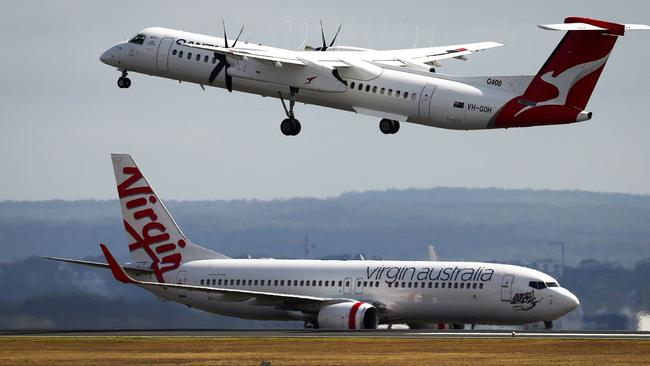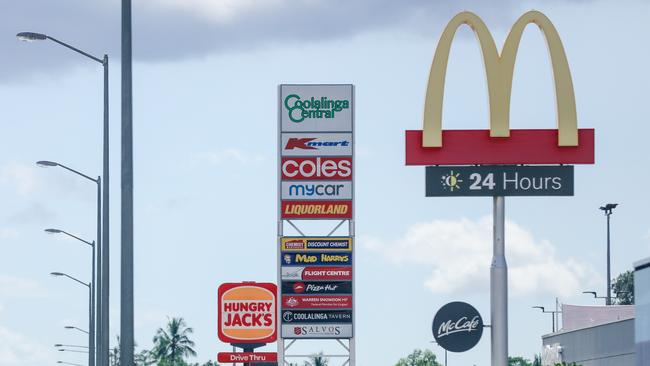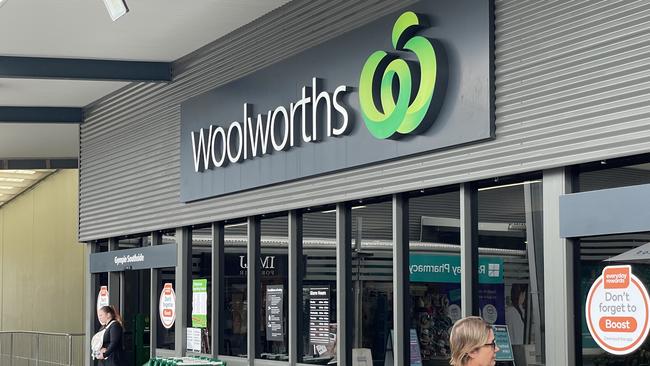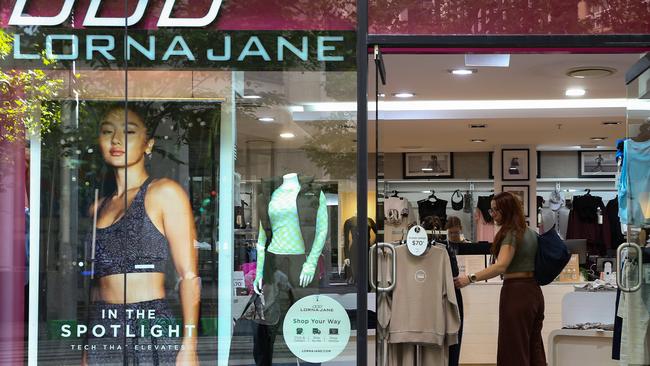Major employers including Qantas and Commonwealth Bank report stark median gender pay gap
Airlines, banks, construction and mining firms have been named and shamed as some of the worst companies paying Australian men significantly more than women.
National
Don't miss out on the headlines from National. Followed categories will be added to My News.
Airlines, banks, construction and mining firms have been named and shamed as some of the worst companies paying Australian men significantly more than women.
The shocking gender pay gap rates at some of the nation’s largest employers will be publicly revealed by the Workplace Gender Equality Agency (WGEA) for the first time on Tuesday.
The data exposes several companies who put considerable efforts into marketing their brands as empowering and supporting women as having a gender pay gap significantly above the Australian national average of 12 per cent.
Cult fitness brand Lorna Jane has a gender pay gap of 37.1 per cent, Pandora Jewelry has a 51.3 per cent gap and women’s clothing brand Forever New is 51.3 per cent.
Australian makeup juggernaut Mecca, which on its website claims to “strive to fight for women” by “empowering female-led businesses, supporting women to become financially secure and independent” has a gender pay gap of 10.3 per cent.

The analysis of pay rates at every company employing 100 or more people in 2022-23, excluding the wages of CEOs, has found more than 3000 companies “favour” men, while about 1500 are considered “neutral” and 400 are more favourable to women.
The pay disparities reported by WGEA are calculated by comparing median total remuneration of female and male employees, which accounts for base salary, superannuation, overtime, bonuses, sales commissions and other non-financial benefits.
Nationally the median Australian woman earns $78,484, while the median man takes home $96,945 — a 19 per cent increase.

With a pay gap of 41.7 per cent, Virgin Australia was the worst performer of all the companies who employ 5000 or more people.
Qantas Airways wasn’t far behind with a gap of 37 per cent, while Jetstar, which has fewer workers, had a gap of 43.7 per cent.
Other major companies like transport business Toll had a gap of 33.7 per cent, and in the construction and infrastructure sector big firms like Ventia Services had a 39.1 per cent disparity, CPB Contractors 38.3 per cent and John Holland 35.8 per cent.
Among the nation’s big banks, Commonwealth Bank has the worst gap of 29.9 per cent, while Westpac is 28.5 per cent, ANZ is 23.1 per cent and NAB is 18.8 per cent.
In the mining sector, Hancock Prospecting had a gap of 22 per cent, BHP Group 20.3 per cent, Fortescue Metals Group 14.6 per cent and Rio Tinto 13.5 per cent.
News Corp Australia, which publishes this masthead, had a gap of 9.4 per cent, while Nine Entertainment reported a 10.1 per cent gap and Seven West Media had 13.8 per cent.

The big supermarket chains all had a similar median gender pay gap, with Woolworths reporting 5.7 per cent, Aldi 5.3 per cent and Coles 5.6 per cent.
The agency behind the data has said a plus or minus of five per cent would be considered “neutral,” meaning pay gaps “do not significantly favour either women or men”.
Only 22 of Australia’s biggest employers had gender parity or even a negative gap, where women were paid on average more than men.
Fast food giant McDonalds had a pay gap of zero, while retailer David Jones recorded a -0.1 per cent gap.
Supermarket chain Ritchies Stores had the biggest negative pay gap of any large employer, with -25 per cent.

The next closest was St Vincent’s Private Hospitals, which had a pay gap favourable toward women of -23.7 per cent.
WGEA chief executive Mary Wooldridge said the data was being released as a “catalyst for improvement” as it made employers publicly accountable.
“This arms employees, consumers, investors and other stakeholders with information about each company’s performance,” she said.
The agency’s analysis found employers in male-dominated industries were more likely to have gender pay gaps in the top 50 per cent, with mining, energy, water, finance and construction sectors the worst offenders.
Accommodation and food services, health care, arts and recreation services had the most employers considered to have a “neutral” gender pay gap.
In the telecommunications sector, Telstra has a gap of 20.1 per cent, while Optus has 14.7 per cent.
20 WORST COMPANIES FAVOURABLE TO MEN
* COMPANIES WITH 5000+ EMPLOYEES
Virgin Australia Airlines Pty Ltd 41.7%
Ventia Services Group Pty Limited 39.1%
Cpb Contractors Pty Limited 38.3%
Qantas Airways Limited 37.0%
Qantas Ground Services Pty Limited 36.4%
John Holland 35.8%
Toll Holdings Limited 33.7%
Byrnecut Australia Pty Ltd 32.3%
Commonwealth Bank Of Australia 29.9%
Westpac Banking Corporation 28.5%
Ugl Pty Limited 27.8%
Visy Industries Australia Pty Ltd 27.4%
Qube Holdings Limited 27.0%
GHD Pty Ltd 26.1%
Veolia Environmental Services (Australia) Pty Ltd 26.0%
Insurance Australia Group Limited 25.2%
Metro Trains Melbourne Pty. Ltd. 24.9%
Bendigo And Adelaide Bank Limited 24.8%
Cleanaway Operations Pty Ltd 24.3%
COMPANIES WITH GENDER PARITY
Accent Group Limited 0.0%
Belgravia Group Pty Ltd 0.0%
Delaware North Companies Australia Pty Ltd 0.0%
FIP GROUP SERVICES PTY LTD 0.0%
Kinetic Group Services Pty Ltd 0.0%
McDonald’s Australia Limited 0.0%
The Trustee For Shahin Family Trust 0.0%
ALL COMPANIES FAVOURABLE TO WOMEN
Ritchies Stores Proprietary Limited -25.0%
St Vincent’s Private Hospitals Ltd -23.7%
Epworth Foundation -17.7%
Healthscope Operations Pty Ltd -11.8%
Ramsay Health Care Australia Pty Limited -9.5%
Drake Supermarkets Pty Ltd -6.9%
Fitness And Lifestyle Group Bidco Pty Ltd -5.6%
Aruma Services -1.8%
Regis Aged Care Pty Ltd -1.7%
Collins Restaurants Management Pty. Ltd. -1.4%
Hoban Recruitment Pty Ltd -1.4%
Venueslive Management Services Pty Ltd -1.1%
IntoWork Australia Ltd -0.9%
Mater Misericordiae Ltd -0.8%
David Jones Pty Limited -0.1%
More Coverage
Originally published as Major employers including Qantas and Commonwealth Bank report stark median gender pay gap





